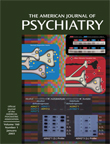Loss of Striatal Vesicular Monoamine Transporter Protein (VMAT2) in Human Cocaine Users
Abstract
OBJECTIVE: The hypothesis that human cocaine users lose vesicular monoamine transporter (VMAT2) protein was tested in striatal samples from cocaine users and age-, sex-, and postmortem interval-matched comparison subjects. METHOD: Striatal samples were retrieved at autopsy; immunoblot assays were then performed by using a highly specific VMAT2 antibody. Striatal radioligand binding to VMAT2 was assessed with dihydrotetrabenazine ([3H]DTBZ) and dopamine levels employing high-performance liquid chromatography. RESULTS: Cocaine users displayed a marked reduction in VMAT2 immunoreactivity as well as reduced [3H]DTBZ binding and dopamine levels. It did not appear that the reduction in VMAT2 immunoreactivity was related to ethanol use, but dopamine levels were lower in subjects with only ethanol diagnoses. Subjects suffering from cocaine-induced mood disorders displayed a greater loss of VMAT2 immunoreactivity that approached significance. CONCLUSIONS: Human cocaine users lose VMAT2 protein, which might reflect damage to striatal dopamine fibers. These neuronal changes could play a role in causing disordered mood and motivational processes in more severely dependent patients.



